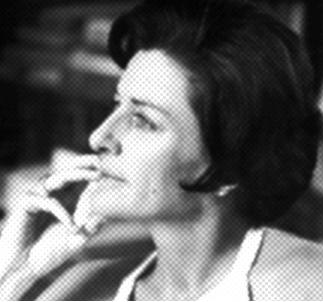
Poetry Reading Club: second poem of the month
Our second poem for this month is "The Operation" (1962), by Anne Sexton. Like "Tulips" (1961), by Sylvia Plath, this poem is set in a hospital and records the speaker's heightened emotional response to a surgical procedure. Like Plath, Sexton is associated with the confessional school of poetry, and many of the questions we asked about the relationship between Plath's life and work can certainly be asked about. Sexton's life and work as well. This relationship between life and art is all the more interesting when we consider the fact that Plath and Sexton knew each other. The two women attended the same creative writing course taught by Robert Lowell in Boston in 1958. I don't know enough about their relationship to say whether it was friendly, competitive, or something in between. What we do know is that Plath greatly admired the work of both Lowell and Sexton, describing in an interview the “emotional and psychological depth” of their poetry as something new and exciting. What excited Plath in particular was that these poets demonstrated for the first time that "peculiar, private, and taboo subjects" could now be written about, could now become the subject of poetry.
We didn't have time to read and talk about Plath's “The Surgeon at 2 am,” a poem which I considered something of a companion piece to “Tulips.” I am sure you will have noticed the recurrence of those red and white images and their associated symbolism throughout this poem as well. Once again, the hospital is a white, clean, unearthly place; once again it is the wild fecundity of nature with its “stenches and colors” that “assail[s]” the speaker. Even more so than “Tulips,” “The Surgeon at 2 am” conveys Plath's sense of the hospital as a “secret religious establishment, [a place where] great cleansings take place.”
Both Plath and Sexton envision the hospital as a place of transformation, but in different ways. How does the voice of Plath's surgeon compare with the voice of the Sexton's patient? Sexton's poem is divided into three parts, offering us a sort-of “before,” “during,” and “after” sequence of the surgical experience. In a poem about surgery, we might expect the body to be opened up, altered in some way, and then put back together again. This happens in “The Operation,” but something is not quite right. Why are we so unsettled at the end of the poem? Why, do you think, does the speaker not believe what “they say,” not believe that she is all better? Is the speaker comforted or haunted by the memory of her mother de ella? How, or when, does she invoke her mother from her, and to what purpose? Finally, how does this make her poem very different from Plath's poems?
There are so many things for us to talk about on Tuesday. Here are some questions to start you thinking:
- At the end of “The Surgeon at 2 am” Plath introduces another color to the poem's scheme: blue. Why do you think she does this? Does this seem out of place in the poem, or does it add another dimension?
- “I am so small / In comparison to these organs!” (“The Surgeon at 2 am”) Is
Plath being ironic about the surgeon's greatness? How does this compare to Sexton's characterization of her surgeon as the “almost mighty doctor”? What do you think these poems are saying about the power of the medical establishment? - There are a number of similar images in both “The Surgeon at 2 am” and “The Operation.” Some of these are: the body of the patient on the trolley; the body as whole/intact vs. the body in parts; the floating body; needles, nurses and other hospital activity; sacrificial or religious imagery. How do Plath and Sexton treat these images? Do they represent the same things in the two poems, or are their meanings different? Which images are the most striking for you? Which ones are the most difficult to interpret? Which ones are the most beautiful?
- What was your response to “The Operation” after you listened to Sexton read it? What qualities, feelings, or associations did her voice de ella convey to you?
I am very much looking forward to hearing your thoughts about these poems.
Happy reading, and see you on Tuesday.
~Chiara
PS Remember to sign up on the International Institute's webpage: https://www.iie.es/agenda/



